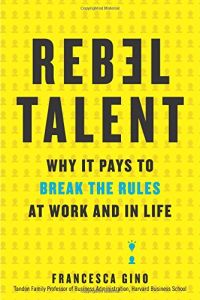Join getAbstract to access the summary!

Join getAbstract to access the summary!
Francesca Gino
Rebel Talent
Why It Pays to Break the Rules at Work and in Life
Dey Street, 2018
What's inside?
Breaking the rules can improve your performance at work and enhance your well-being in life.
Recommendation
“Comfort is overrated,” writes Francesca Gino about the consequences and benefits of breaking the rules. Rebellion, says the Harvard Business School professor, stimulates creativity, nurtures professional relationships and enhances your engagement with your work. But going against the grain isn’t always easy. You have to be open to working with diverse people and different perspectives, be willing to expose your flaws and vulnerabilities, and prepare for the backlash that often awaits those who step out of line. Gino contends that such discomforts are a relatively small price for the creative energy and passion for your work that rule-breaking unleashes. In a matter-of-fact and often subtly humorous style, she dissects the elements that make up a rebel’s psychology and shows you how to acquire them. Her book will be of special interest to entrepreneurs and creatives, and it’s an excellent resource for career development.
Summary
About the Author
Award-winning researcher Francesca Gino is the Tandon Family Professor of Business Administration at Harvard Business School and heads its Negotiation, Organizations and Markets Unit. The Poets & Quants website named her one of the world’s top 40 business professors under age 40.

















Comment on this summary